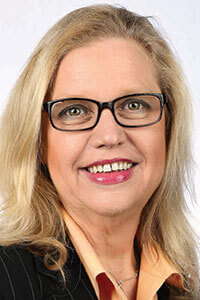
While food and beverage and audiovisual services are the most expensive line items of an event, they also can create the most value for attendees.
For years, the most expensive line items in a meeting budget have been food and beverage and audiovisual services. As Instagram-worthy plates have become increasingly important for event marketing, and as more hotels pressure planners to use in-house AV systems, these expenses continue to rise.

Donna Jarvis-Miller
Event professionals responding to Convene’s most recent Meetings Market Survey said that F&B remained their single-largest expense, accounting for 31 percent of costs at their largest 2018 event. And while respondents indicated that they’ve been asked to cut a range of expenses for upcoming meetings, food and beverage has consistently topped their list (63 percent were asked to cut this line item last year), followed by audiovisual (nearly half were asked to scale back on AV).
While these services are the most expensive, they also can create the most value for attendees. An innovative presentation of a delectable meal topped by a decadent dessert will generate excitement and positive social-media attention. On the other hand, a session where the speaker can’t be heard or the video keeps cutting out will frustrate and even anger attendees. So it’s crucial for planners to find strategies for cutting costs without compromising the experience.
“That’s always the quest, to do it better while spending less,” said Donna Jarvis-Miller, CMP, CEM, director, membership and events at the American Public Human Services Association (APHSA). With responsibility for seven conferences and five smaller meetings each year, Jarvis-Miller and her planning committee have worked to leverage the organization’s buying power to negotiate better terms on AV and food and beverage services.
For Angie Silberhorn, CMP, conference director at the Warehousing Education and Research Council (WERC), creating great experiences at lower prices starts with building relationships. “I find I get the best results when I establish an open, honest partnership with the catering or AV staff,” she said. “I communicate clearly and as far in advance as possible about our needs, desired outcomes, and budget, and allow them to get creative in their proposals to achieve our goals. They’re the experts on what they can do and usually come up with ideas I may not have considered if I were simply trying to dictate my ideas to them or not being honest about our budget challenges.”
Here’s how these and other event professionals are cutting costs on essential services without sacrificing a memorable attendee experience.
Audiovisual
Reconsider every AV need. At APHSA, Jarvis-Miller and her team dissect each session of each conference to make sure they’re ordering only the necessities. “We ask speakers, what do you absolutely need? Do you need a flip chart, microphone, screen, projector?” Jarvis-Miller said. “We used to just pro- vide everything for everybody, but it often wasn’t used.”
To cut costs, APHSA established a rule that there’s no microphone in a room with fewer than 50 people. If sound is needed for a video, they use a wireless Bluetooth speaker that can be purchased for about $100 each, Jarvis-Miller said.

Trey Smith
Don’t agree to clauses that don’t work for your group. Increasingly, hotels are pressuring groups to use their in-house AV providers — and for those who refuse, charging “extraordinary fees” for services such as power, rigging, lighting control, shipping and receiving, and technology fees for outside vendors, said Trey Smith, vice president, events, at Human Capital Media. “Whether you know you will be using a third party or not, always negotiate down or out any and all of these ancillary fees so you have the flexibility to solicit bids and make an informed decision,” he said. “Your room and F&B revenue potential is much more valuable to the hotel than the potential revenue from power and internet. They won’t allow their AV partner to be the reason they lose the business. If they seem unwilling to negotiate on your behalf, find another venue who is.”
Similarly, when it’s in the best interests of her organization to use its established AV partner, Silberhorn said she would never agree to a hotel contract clause requiring use of in-house AV, or a clause charging extra fees for using a third-party AV company. Even if the hard costs are comparable, changing AV providers would require her staff to spend extra time and effort to train a new AV team on the intricacies of the group’s needs and preferences. Instead, she works to ensure that her organization is flexible enough to choose another hotel if they can’t come to terms that are in the best interest of the group.
“Hotels requiring the third-party AV company to agree to operational terms and conditions and reasonable oversight is understandable, but excessive additional fees or mandatory use of the in-house company are not,” Silberhorn said. “That said, for smaller meetings with basic requirements, I do typically find it in the group’s best interest to use the in-house AV provider because of their knowledge of and access within the facility and availability of inventory and staff.”
Find and work with suppliers you trust. Silberhorn’s relationship with an AV company that understands her group and its needs makes it easy for her to realize the additional costs and effort required to work with another provider. She recommends that planners “have a clear vision of what you need to achieve, then communicate, communicate, communicate, as far in advance as possible. Don’t wait until the 11th hour to start discussions with your supplier partners and then expect them deliver good, fast, and cheap.”
Food & Beverage
Negotiate everything. As with AV, Smith recommends negotiating F&B tirelessly during the contracting phase. While 10 percent is a standard for catering menu discounts, “you may be able to negotiate more,” he said.
Reconsider guarantees. For receptions or station events, don’t guarantee 100-percent consumption for each item. “Offer a variety for a reasonable amount of people who are likely to consume,” Smith advised. “It saves money and offers a better attendee experience than guaranteeing 100 percent for a cheese-and-fruit display.”
Jarvis-Miller tries to negotiate a guarantee of 80 percent rather than 100 percent, especially for breaks or all-day catering packages. “Not everyone will drink a soda, have coffee, and eat a cookie at every break,” she said.
Call the chef. If Jarvis-Miller’s F&B budget is tight for a particular event, she goes right to the chef. “Sometimes the service manager doesn’t want the meeting planner to speak directly with the chef, but I’ve learned it’s important and I really push for those conversations,” she said. “With the chef, I can tell them what I really want and the amount I can spend per person, and ask what they can do.” In many cases, she has found, chefs are expert at developing creative menus that fit the budget.
Get transparent with leadership. When leaders are pushing for budget cuts, it can help to sit down and show them the budgets of your events and explain the costs, as they may not understand exactly where the money’s going. “Sometimes you have to make an investment in the meeting and candid conversations with the CFO and finance committee can help them understand why it takes $250,000 to feed 1,000 people,” Jarvis-Miller said. “Put your cards on the table and show them, ‘This is what I have to have to continue creating an experience and growing the meeting.’”
Nancy Mann Jackson is a freelance writer based in Birmingham, Alabama.
TEST TIME
- Earn one clock hour of certification credit by reading this story and sidebars (links below), and by brushing up on your negotiation skills by reading “Ten Tips for Negotiating in 2019,” by Ed Brodow.
- To earn certification clock hours, visit our CMP Series page to answer questions about information contained in this CMP Series article and the additional material. If the latest quiz isn’t posted, please return at a later date.
The Certified Meeting Professional (CMP) is a registered trademark of the Events Industry Council.
